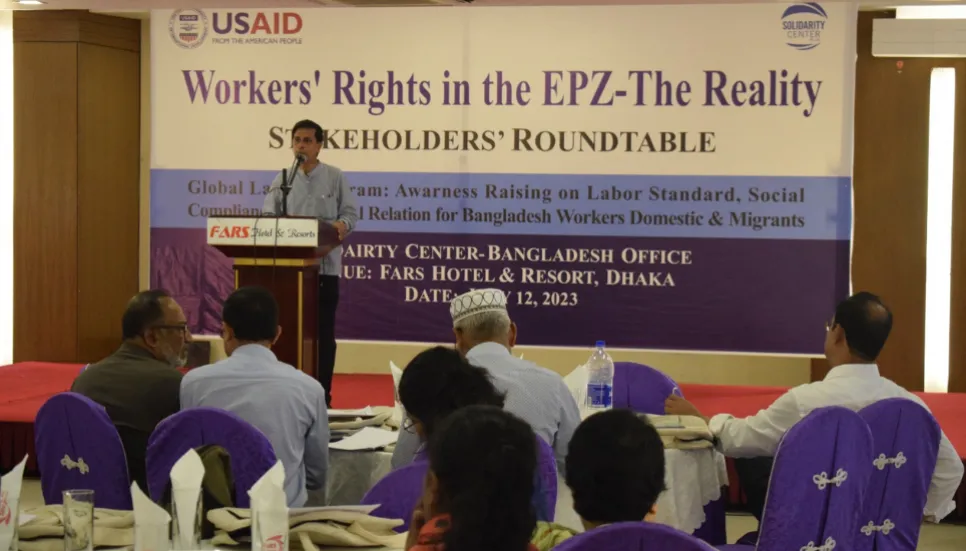
Authorities should take steps to reform the Bangladesh EPZ Labor Act, 2019, to give workers’ rights to freedom of association and collective bargaining.
Speakers made the call at a roundtable on “Workers’ Rights in the EPZ-The Reality” held at a hotel in the capital’s Paltan area on Wednesday, said a press release.
Solidarity Center-Bangladesh office (SC-B) hosted the event under USAID’s Awareness Raising Training Program for Garment, Domestic, and Migrant Workers in Bangladesh.
In her opening remarks, Monika Hartsel, SC-B deputy country director, said, “Under the EPZ Act, workers are still denied the fundamental right to freedom of association. Without the ability to form and join unions, workers are not able to engage in effective collective bargaining with their employers over the terms and conditions of their work.”
Commenting on the status of workers’ rights in EPZ, Advocate Salim Ahsan Khan said, “The EPZ Act allows workers to form Workers Welfare Association. But through this association, they are prohibited from establishing any kind of connections with any NGOs, trade unions, or federations outside the EPZ and are also not able to maintain any connections with the workers outside respective factories. Now the newly formulated EPZ Labor Rule prohibits the workers further from getting involved in any political parties. So, the ability of the EPZ workers to seek reparation for the violation of their labour rights is very limited.”
SC-B Country Program Director AKM Nasim said, “We emphasise the scope of freedom of association of EPZ workers and their access to the judiciary. EPZ Labor Act allows workers to form workers' welfare associations. But I can challenge that if BEPZA does not allow it, nobody has the power to form an association inside the EPZs. They only allow their prescribed methods.”
District and Session Judge M A Awal, also a member of the Labor Appellate Tribunal, said, “In all the developed countries laws are formulated with consultation of the relevant stakeholders. Here, we formulate laws without concerning the stakeholders. As a result, it needs continuous amendment. There is no necessity for separate labour laws for EPZ workers and other workers.”
Addressing as a special guest, International Labor Organization (ILO) Bangladesh Country Director Tomo Poutiainen said, “There are many countries in the world besides those under EU who have taken up modern approach to worker rights in their export procession zones. And they are doing very well. If you allow EPZ workers to form an association and collectively bargain, it enhances the quality of worker-management relationship and opens new possibilities.”
Solidarity Center program officer presented the keynote in the event and Senior Program Officer Lily Gomes was the moderator.
BEZA Joint Secretary Md Khairul Hassan, BEPZA Additional Executive Director Md Nazmul Islam, Vice President of Bangladesh Labor Court Sharmin Sultana, and representatives of different NGOs and civil society members were also present at the event.
As per Bangladesh Export Processing Zone Authority data, at present, around 516,588 workers are employed in EPZs, of which 66 per cent are women. Exports from EPZs increased to eight and a half billion dollars in FY 2021-2022, and 54 per cent of this export income came from the garment sector.